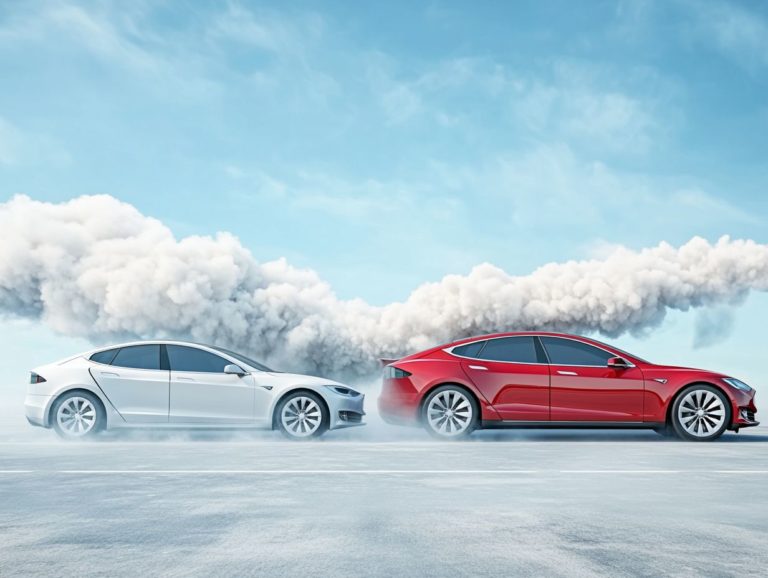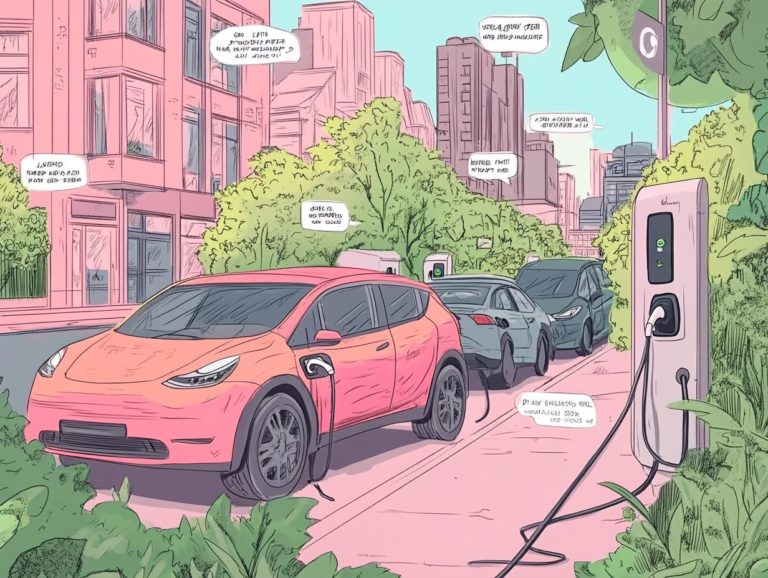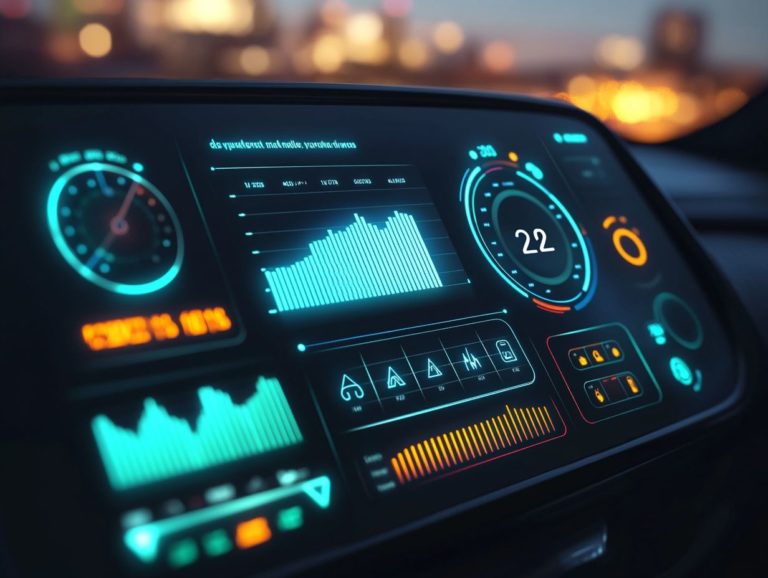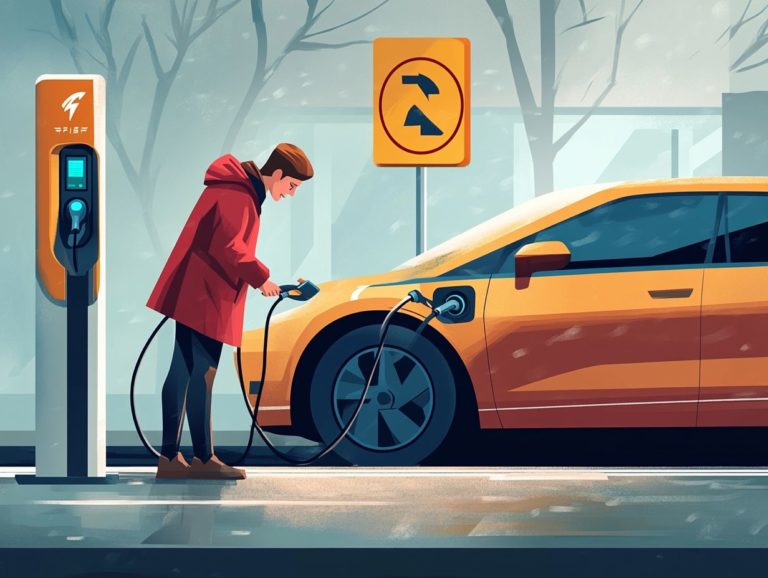What Are the Benefits of Driving an EV?
As the world transitions to more sustainable solutions, you ll find that electric vehicles (EVs) are becoming the go-to choice for environmentally conscious drivers like yourself.
But it s not just their eco-friendly image that makes them appealing. EVs bring a multitude of compelling benefits to the table. They significantly reduce carbon footprints and improve local air quality. Additionally, they often come with enticing financial incentives and lower maintenance costs. The advantages are abundant and hard to ignore.
This article delves into the multifaceted benefits of driving an EV, guiding you to understand why making the switch could be a savvy decision for both your finances and the planet.
Contents
Key Takeaways:
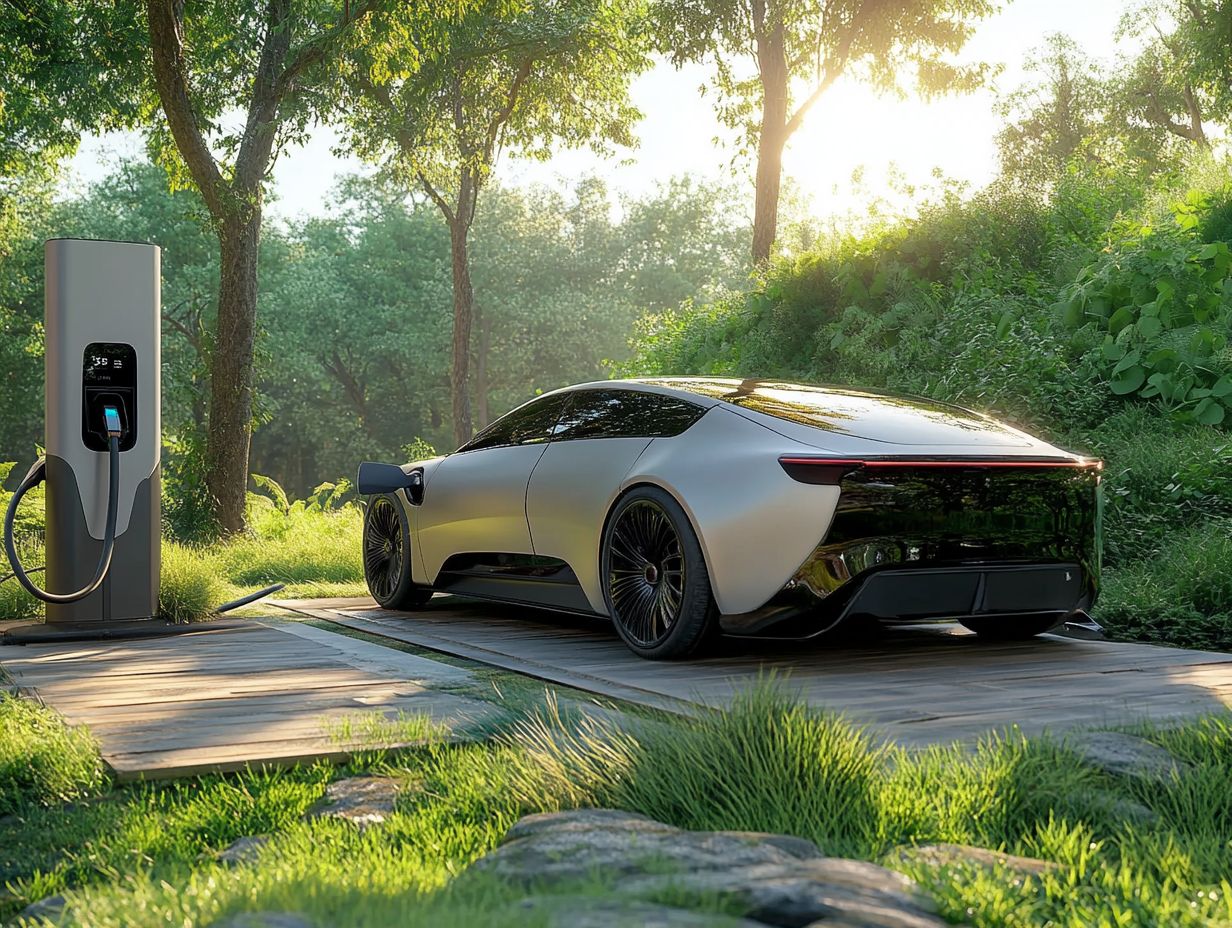
- Reduce your carbon footprint and improve air quality.
- Save money on fuel and enjoy tax incentives.
- Experience smooth driving with low maintenance costs.
What is an EV?
An electric vehicle (EV) is an automobile that uses electric motors instead of relying on traditional internal combustion engines, significantly reducing your need for fossil fuels.
You can explore various types of EVs, including Battery Electric Vehicles (BEVs) and Plug-in Hybrid Electric Vehicles (PHEVs). Both utilize advanced battery technology to store and use renewable energy efficiently.
Leading automotive manufacturers like Tesla, BMW, and the Volkswagen Group are driving this electric vehicle revolution. They are making substantial contributions to the expanding EV market in California and beyond.
Environmental Benefits of Driving an EV
Driving an electric vehicle (EV) offers numerous environmental advantages, especially in its remarkable ability to cut down on pollution and greenhouse gas emissions compared to traditional gasoline-powered cars. To learn more about the benefits and challenges, check out the pros and cons of EV ownership.
Embracing the shift to electric vehicles is essential for enhancing air quality and addressing climate change. EVs emit zero tailpipe emissions and leverage cleaner energy sources, significantly lowering carbon emissions from the transportation sector.
Promoting the adoption of electric motors plays a critical role in achieving carbon neutrality in urban centers like California.
Reducing Carbon Footprint
Electric vehicles are crucial for reducing the carbon footprint of the transportation sector. They dramatically lower CO2 emissions compared to conventional fossil fuel-powered vehicles.
Studies show that by switching to electric motors, you can cut greenhouse gas emissions by as much as 60% over the vehicle’s lifetime, especially when charged with renewable energy. For instance, the Union of Concerned Scientists found that electric vehicles emit less than half the emissions of gasoline-powered cars.
As more countries invest in sustainable transportation infrastructure and renewable energy, the overall environmental impact improves. This transition not only helps combat climate change but also fosters cleaner air in urban areas, underlining the vital role electric vehicles play in creating a sustainable future.
Improving Air Quality
The shift toward electric vehicles is crucial for enhancing air quality in urban areas. EVs emit no harmful tailpipe pollutants that contribute to air pollution and respiratory issues.
A growing body of research shows that widespread adoption of EVs can lead to significant improvements in public health, particularly in densely populated regions. For example, a study published in the journal Environmental Health Perspectives suggests that transitioning to electric mobility could reduce particulate matter levels by as much as 23%. This reduction has the potential to decrease the incidence of asthma, cardiovascular diseases, and other health problems linked to poor air quality.
The World Health Organization has identified air pollution as a major global health risk, disproportionately impacting low-income communities. By embracing cleaner transportation options, cities can create healthier living environments and lay the groundwork for sustainable urban development.
Financial Benefits of Driving an EV
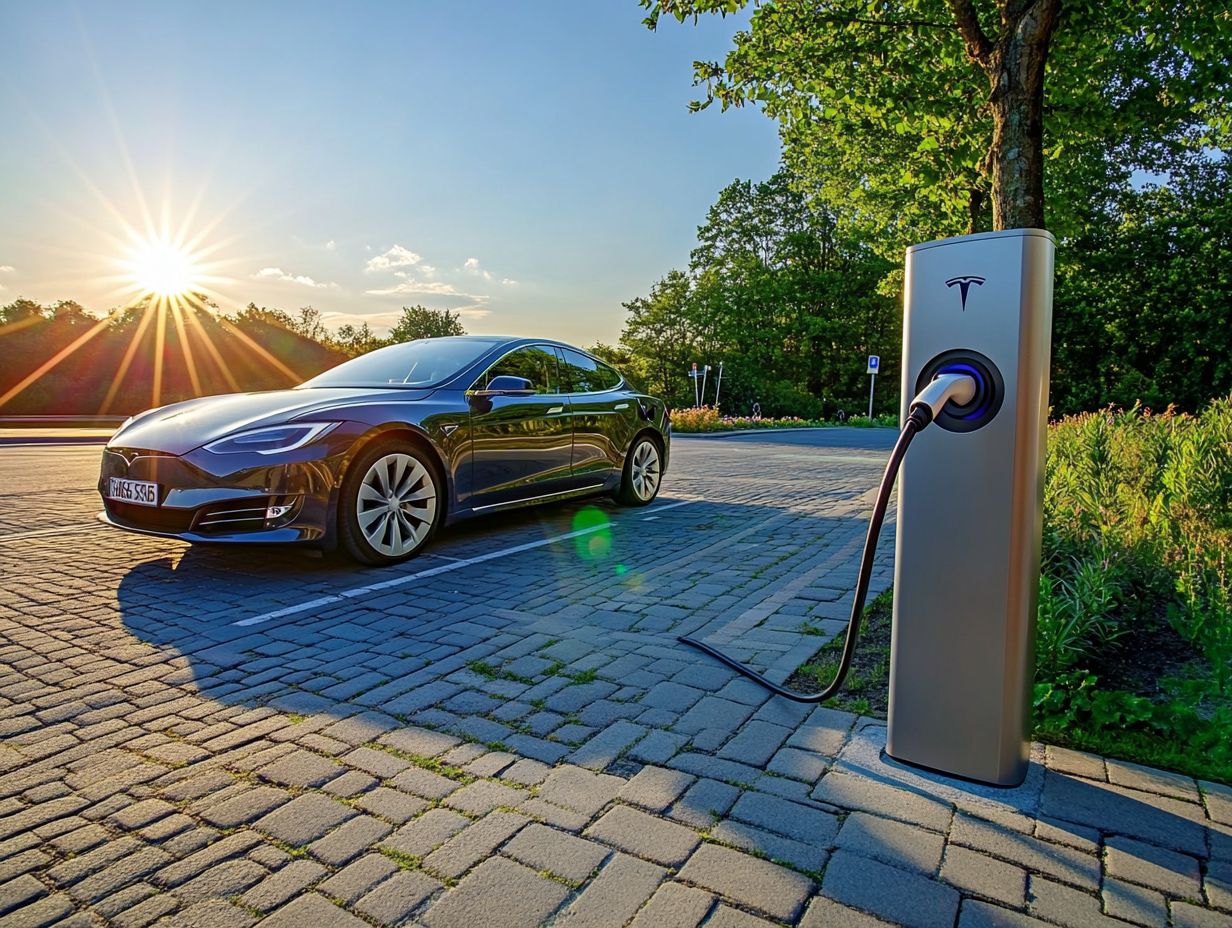
Driving an electric vehicle (EV) offers a range of financial advantages that can enhance your wallet’s well-being. You’ll enjoy reduced maintenance costs and exceptional fuel economy, leading to substantial savings over time, along with the environmental benefits of EVs.
Many consumers can tap into federal investment opportunities, tax credits, and local incentives. This makes the switch to electric cars not just appealing but also affordable.
Lower utility costs tied to charging an EV, especially compared to traditional fuel expenses, create a more sustainable financial model for drivers, particularly in states such as California and New Jersey.
Savings on Fuel Costs
One of the most compelling financial advantages of driving an electric vehicle is the remarkable savings on fuel costs. EVs typically offer much better fuel efficiency than gasoline-powered cars.
The cost per mile for electric vehicles is significantly lower. Charging your EV costs about 3 to 5 cents per mile, while gasoline vehicles usually cost around 12 to 18 cents per mile. This difference can lead to significant savings!
With the growing number of charging stations and advancements in electric vehicle supply equipment, keeping your EV charged has never been more convenient. This boosts your potential for savings and positions electric vehicles as a smart financial investment.
Tax Incentives and Rebates
Tax credits and rebates, such as the federal tax credit and local offerings under the Inflation Reduction Act and the Clean Air Vehicle program, enhance the allure of investing in an electric vehicle.
These incentives can lower the upfront costs associated with purchasing an EV, allowing you to save money right away. Many states provide additional rebates that can complement the federal credit, maximizing your savings.
Programs designed to promote green technologies may offer grants or subsidies for home charging installations, adding convenience and value to your switch to electric.
With lower maintenance costs and savings on fuel amid rising gas prices, these financial advantages lower the total cost of ownership. This makes electric vehicles an increasingly compelling choice for those who are environmentally conscious.
Convenience and Performance Benefits of Driving an EV
Electric vehicles (EVs) present exceptional convenience and performance advantages. They feature instant power from electric motors, providing quick acceleration and a seamless driving experience truly a pleasure to drive.
Charging infrastructure continues to expand, making it easier to recharge an EV and significantly enhancing your overall driving experience, especially in urban settings.
Instant Power and Smooth Driving
One standout benefit of driving an electric vehicle is the instant power it offers, leading to rapid acceleration and a remarkably smooth driving experience. This often leaves traditional gasoline vehicles behind.
This impressive feature allows electric motors to send power directly to the wheels, eliminating the lag you might be used to with internal combustion engines. As a result, you can enjoy seamless starts from a standstill, making highway merges and urban navigation feel effortless.
The immediate responsiveness enhances the driving dynamics, creating a more engaging and enjoyable ride. Additionally, the low center of gravity typical in electric vehicle designs improves handling and cornering capabilities, giving you greater confidence on winding roads.
Ultimately, the combination of instant power and refined performance can turn your daily commute into an exhilarating adventure.
Less Maintenance and Repairs

Electric vehicles typically require less maintenance and fewer repairs compared to traditional vehicles, resulting in significantly lower maintenance costs over time. This advantage comes from their simpler mechanical design and improved battery design.
The streamlined design of EVs means they have fewer moving parts, which reduces friction and wear on critical systems. Unlike combustion engines that depend on many components like pistons, valves, and exhaust systems, electric vehicles usually just have a motor and a few gears. This significantly minimizes the risk of mechanical failure.
The regenerative braking system commonly found in EVs enhances energy efficiency and extends the lifespan of brake components. This means you ll be replacing them less often. The reliability of electric vehicles contributes to a smoother driving experience and builds greater confidence in their long-term performance.
Considerations When Switching to an EV
When thinking about switching to an electric vehicle (EV), consider several essential factors. The availability of charging stations and the vehicle’s driving range are crucial.
It s also important to evaluate the overall cost of buying and owning an EV compared to traditional vehicles. Understanding battery technology and federal clean car standards can greatly influence your decision.
Charging Options: Get Ready to Go!
The availability of charging infrastructure and the driving range of electric vehicles are key factors in your decision to switch to an EV. Range anxiety is a common concern for many potential buyers, and it s understandable to feel hesitant.
However, recent advancements in charging technology have made it easier than ever to find reliable charging stations. This effectively addresses those lingering worries. Rapid-charging networks are expanding in both urban and rural areas, allowing you to recharge your vehicle much faster than before.
This expansion not only eases fears of running out of battery power but also contributes to the overall adoption of EVs by enhancing their convenience and accessibility. As charging stations become more common and innovative solutions like ultra-fast chargers emerge, they play a vital role in boosting consumer confidence and accelerating the shift toward a more sustainable automotive future.
Cost of Purchasing and Owning an EV
Understanding the cost of buying and owning an electric vehicle is crucial for you as a potential buyer. Factors such as the initial purchase price, maintenance costs, and utility expenses can vary significantly from those of conventional vehicles.
Explore potential incentives like federal tax credits, state rebates, and grants that can ease the upfront financial burden. Beyond those initial costs, you ll often find that ongoing expenses for an electric vehicle include lower maintenance and fuel costs. Many owners enjoy reduced electricity bills compared to gasoline prices.
It s also important to consider additional costs related to insurance, battery replacement, and the installation of home charging stations. These can all contribute to the overall financial picture. By evaluating these factors, you can make a more informed decision and better understand the true cost of electric vehicle ownership.
Frequently Asked Questions
What Are the Benefits of Driving an EV?
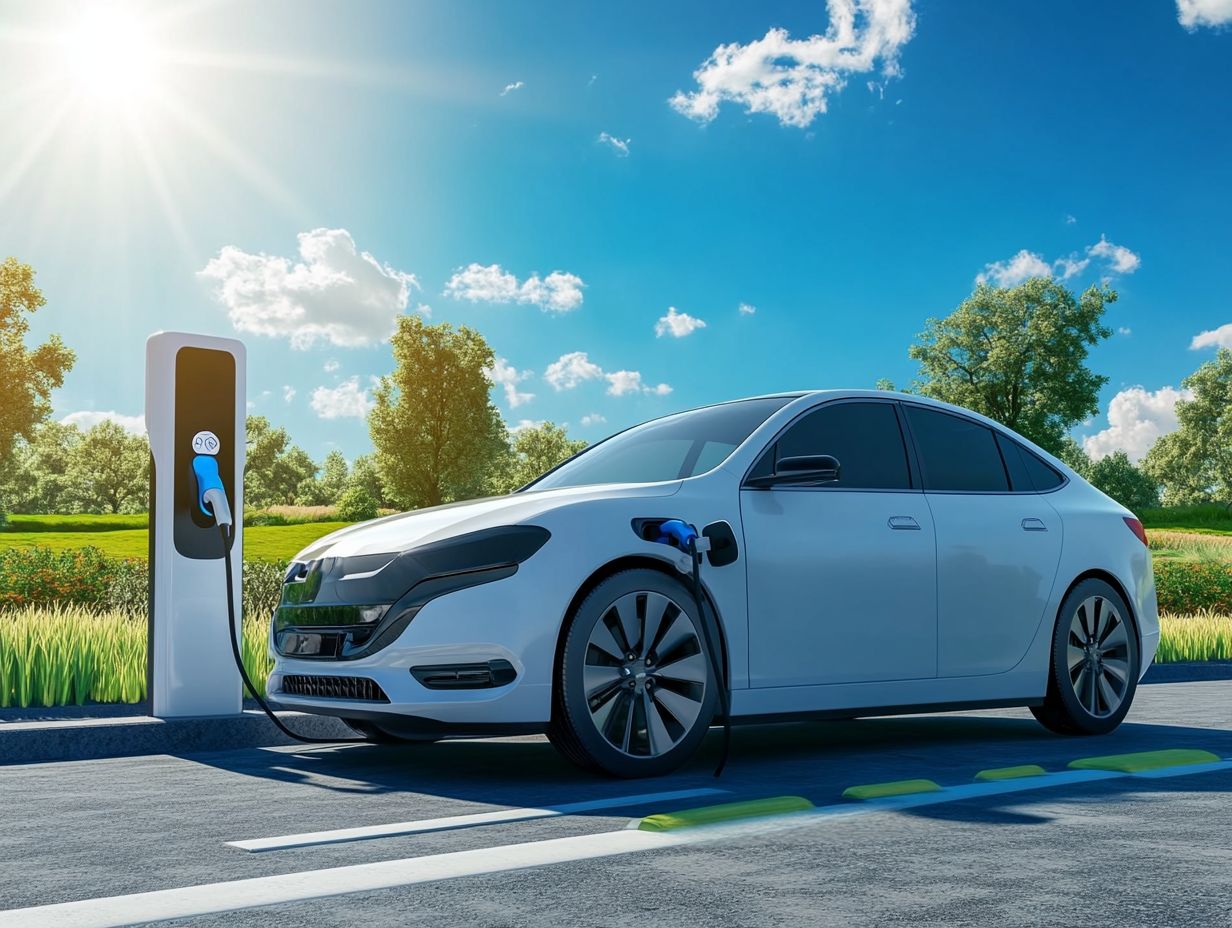
- Cost Savings: Lower operating costs.
- Reduced Maintenance: Fewer repairs needed.
With the growth of charging stations, there’s never been a better time to switch to an EV! Consider making the switch today for a more sustainable future.
What Are the Benefits of Driving an EV?
1. Environmental Friendliness: EVs produce zero emissions. Driving one helps reduce your carbon footprint and can combat climate change.
2. Convenient Charging: Charge your EV at home and skip the gas station. This saves you time and hassle.
3. Reduced Dependence on Fossil Fuels: EVs lessen your reliance on limited fossil fuels. You can use renewable energy, like solar or wind power, to charge your car.
4. Quiet and Smooth Ride: Electric motors operate quietly and deliver a smoother ride than gasoline engines. Enjoy a peaceful driving experience while reducing noise pollution.
5. Government Incentives: Many governments offer tax credits or rebates for EV drivers. These incentives help make owning an EV more affordable.

